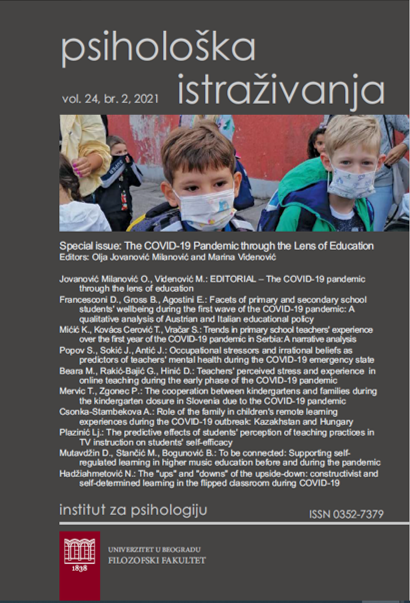Prednosti i nedostaci obrnute učionice: Konstruktivističko i samoodređeno učenje za vreme pandemije COVID-19
The “ups” and “downs” of the upside-down: constructivist and self-determined learning in the flipped classroom during COVID-19
Author(s): Nina HadžiahmetovićSubject(s): Psychology
Published by: Филозофски факултет, Универзитет у Београду
Keywords: constructivist learning; flipped classroom; basic needs; pandemic
Summary/Abstract: The flipped classroom method (FCM) is based on individual online learning followed by student-teacher group interactions and has shown some advantages over traditional learning even in the pre-COVID-19 pandemic context. FCM is conducive to the constructivist learning approach, characterized by active knowledge construction rather than passive consumption of predetermined concepts. Both approaches are expected to facilitate the satisfaction of the basic psychological needs of autonomy, competence, and relatedness as proposed by self-determination theory (SDT). Given the outbreak of the COVID-19 pandemic, however, FCM has been imposed on many universities that lack the resources to take a constructivist approach and satisfy students’ basic psychological needs. Considering the challenges of inverted teaching induced by the pandemic, this review paper aims to further address the following problems in an integrated theoretical framework: What are the pros and cons of the pandemic-constructed flipped classroom?; Is constructivistlearning possible and to what extent during the pandemic?; How can a constructivist environment be created in the pandemic-constructed flipped classroom? Can the flipped classroom be used as a virtual mediator between the constructivist learning environment and students’ basic psychological needs? More specifically, the purpose of this paper is to integrate constructivist learning within the flipped classroom method and to explore how constructivist learning may facilitate basic psychological needs through the characteristics of the flipped classroom. The paper proposes a conceptual framework of the constructivist environment associations with basic psychological needs through the perceived usefulness of technologymediated flipped classrooms. Specifically, it explores whether the communicative,instrumental, and pedagogical functions of the flipped classroom could help satisfy students’ basic psychological needs. Challenges to the practical and empirical applications of the framework are discussed.
Journal: Psihološka istraživanja
- Issue Year: 24/2021
- Issue No: 2
- Page Range: 303-324
- Page Count: 22
- Language: English

